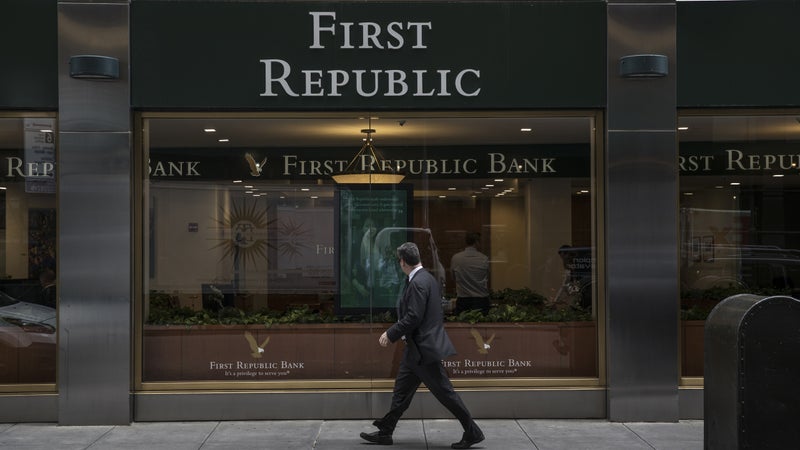7 best ways to insure excess deposits

The Bankrate promise
At Bankrate we strive to help you make smarter financial decisions. While we adhere to strict , this post may contain references to products from our partners. Here's an explanation for .
Our writers and editors used an in-house natural language generation platform to assist with portions of this article, allowing them to focus on adding information that is uniquely helpful. The article was reviewed, fact-checked and edited by our editorial staff prior to publication.
Key takeaways
- Bank networks, such as IntraFi Network Deposits and Impact Deposits Corp., can help spread excess deposits across multiple FDIC-insured banks for maximum coverage.
- Opening accounts with different ownership categories, such as joint accounts or trusts, can also increase FDIC insurance coverage.
- Other options for insuring excess deposits include brokerage accounts and credit unions.
After nearly two and a half years without a bank failure, some of the largest failures in U.S. history hit hard last year, prompting countless many bank customers to familiarize themselves with the Federal Deposit Insurance Corp. (FDIC). and the coverage it provides to customers through its member banks.
Even during times when bank failures aren’t common, it’s always important to know your FDIC limits. And if you have excess deposits, it’s important to know your options. Here are seven of the best ways to insure excess deposits that you may have.
1. Understand FDIC limits
The FDIC insures traditional deposit products, such as checking, savings and money market deposit accounts (not money market mutual funds) and certificates of deposit (CD), as well as cashier’s checks, money orders and other items issued by a bank. These deposits are insured for up to $250,000 per depositor, per FDIC-insured bank, per account ownership category. The FDIC insurance limit has been the same for more than a decade.
The FDIC doesn’t insure investment products, such as stocks, bonds, mutual funds, annuities and life insurance policies. Nor does it cover the contents of safe-deposit boxes.
To understand FDIC limits, you must know about the different account ownership categories, among them: single (one owner), joint (two or more owners), certain retirement accounts like IRAs or Keogh plans, and revocable and irrevocable trust accounts. The FDIC explains ownership categories and how they work here.
If your deposits exceed the $250,000 FDIC insurance limit, talk to your bank about the insurance status of your deposits and your options for insuring all of your savings in-house. You may have to spread money around into different accounts with joint owners or beneficiaries or use more than one FDIC-insured bank to insure all your money.
The FDIC’s Electronic Deposit Insurance Estimator can help you figure out how much of your bank deposits are insured.
The FDIC also has a phone number you can call: 877-ASK-FDIC (877-275-3342).
2. Use bank networks to maximize coverage
If you want to spread your money around to expand your FDIC coverage, there are bank networks that can do it for you. IntraFi Network Deposits will put your excess deposits in checking accounts, money market accounts and CDs at separately chartered FDIC banks in its network. IntraFi Network Deposits absorbed what used to be called the Certificate of Deposit Account Registry Service, or CDARS, and Insured Cash Sweep, or ICS.
Similarly, Impact Deposits Corp. offers insurance protection for excess deposits through its network of almost 200 FDIC-insured community banks. The deposits make funds available for lending in those communities, and 2 basis points of deposits in participating banks are donated to local nonprofits. (One basis point equals 0.01-percent.)
Using a bank network to protect excess deposits is convenient. You also receive account summaries and a Form 1099 for your taxes.
Another option is the Depositors Insurance Fund, a Massachusetts-based insurer of excess deposits. Any amount above the FDIC’s coverage ceiling is guaranteed. There are no forms to fill out, and no separate titling of accounts is necessary. If you don’t live in Massachusetts, you’re not necessarily left out: Many of the DIF member banks have branches out of state.
3. Open accounts with different ownership categories
Let’s say you have $300,000 in checking, savings and money market accounts in your name alone at a local bank. Because the FDIC limit is $250,000, $50,000 of your money isn’t insured because you’re the only depositor. One way to insure all of your money is to open accounts with different ownership categories.
For example, you could open a joint savings account with a spouse — or almost anyone for that matter — and be eligible for up to $500,000 in FDIC insurance because each account holder is insured for up to $250,000.
You could set up a trust and name beneficiaries who would receive the money upon your death, if you have significant excess deposits. Each beneficiary is insured for up to $250,000.
If you have a business account and a personal account at the same bank, those are separate ownership categories that can increase your FDIC insurance coverage.
Setting up accounts with different ownership categories is worth discussing with your banker or other financial advisor.
4. Open accounts at several banks
You can easily insure your excess deposits by opening accounts at separately chartered banks to expand your FDIC coverage, if you’re willing to put in the time and are organized enough to keep tabs on your accounts. Opening accounts at different branches of the same bank won’t increase your insurance.
Opening accounts at several banks is also a good way to take advantage of some of the best rates on CDs. Consider using several banks to create a CD ladder. The best rates on CDs and other deposit accounts are typically offered by online banks. It’s easy to open accounts online and to manage them.
5. Consider brokerage accounts
If you have more than $250,000 saved, it may be a good idea to set up a brokerage account with an institution such as Fidelity Investments or Charles Schwab. Brokerages typically offer CDs from different banks across the country, giving you the convenience of one-stop shopping.
Be aware that you’re responsible for making sure your money is spread out among separately chartered banks to maximize your FDIC insurance.
6. Deposit excess funds at a credit union
Credit unions are another good spot for excess deposits that aren’t FDIC-insured. The National Credit Union Share Insurance Fund (NCUSIF) is the federal insurer of deposits at National Credit Union Administration (NCUA)-member credit unions. NCUA insurance, like FDIC insurance, is backed by the full faith and credit of the U.S. government.
Like the FDIC, the Share Insurance Fund insures individual deposit accounts up to $250,000. The Share Insurance Fund also separately insures IRA and Keogh retirement accounts and revocable and irrevocable trust accounts up to $250,000.
You can use the NCUA’s Share Insurance Estimator to see if all your credit union deposits are covered.
You have to become a credit union member to open a deposit account, but membership requirements are often lenient, extending to family and friends.
7. Other strategies for insuring excess deposits
Wintrust Financial has a business model that works well for excess deposit coverage. The company owns 15 separately chartered community banks in the greater Chicago area and Wisconsin. It offers the MaxSafe account, which allows an individual to insure up to $3.75 million by opening CD and money market accounts with Wintrust’s chartered banks.
With various account ownership titles, that dollar amount can go significantly higher. For example, a married couple and their college-age child can open separately titled MaxSafe accounts to greatly broaden their financial protection.
Wintrust has historically offered this service to locals in Chicago and Milwaukee. MaxSafe customers get account summary statements and a single Form 1099, too.
Bottom line
Any individual or entity that has more than $250,000 in deposits at an FDIC-insured bank should see to it that all monies are federally insured.
It’s not only diligent savers and high-net-worth individuals who might need extra FDIC coverage. Corporations, family foundations, governments and charities also use bank networks and other measures to expand federal insurance protection of their deposits.
